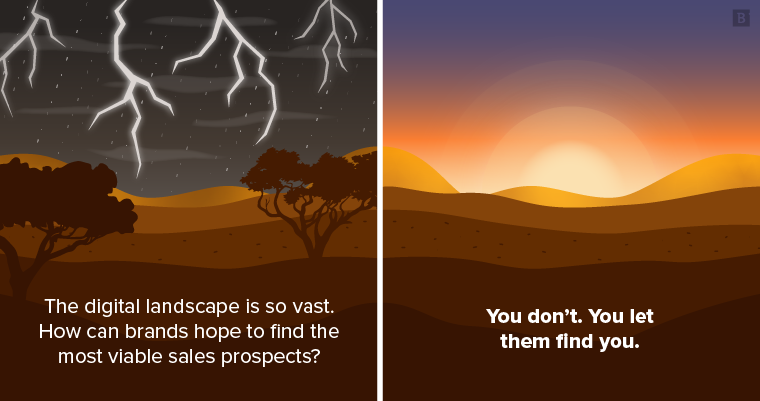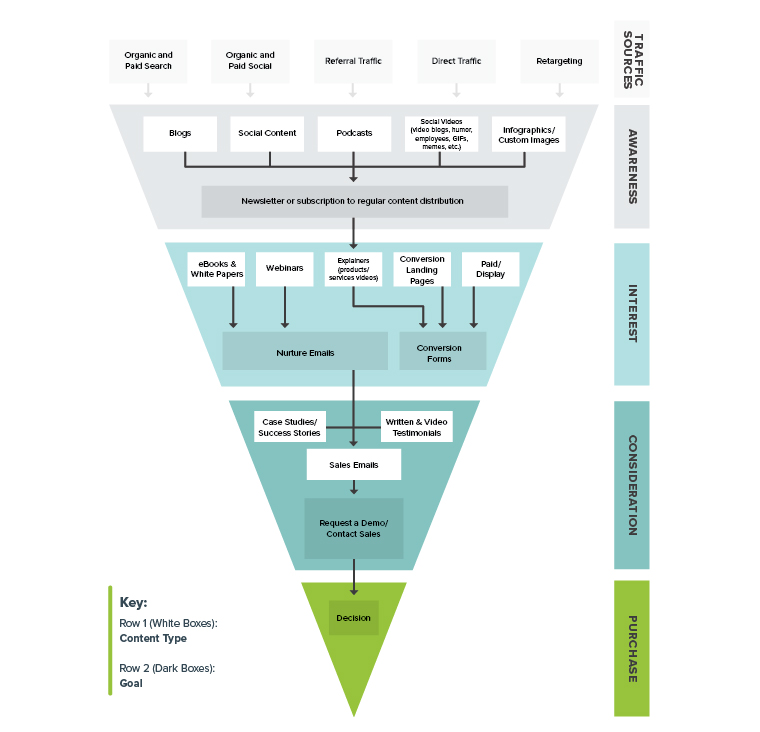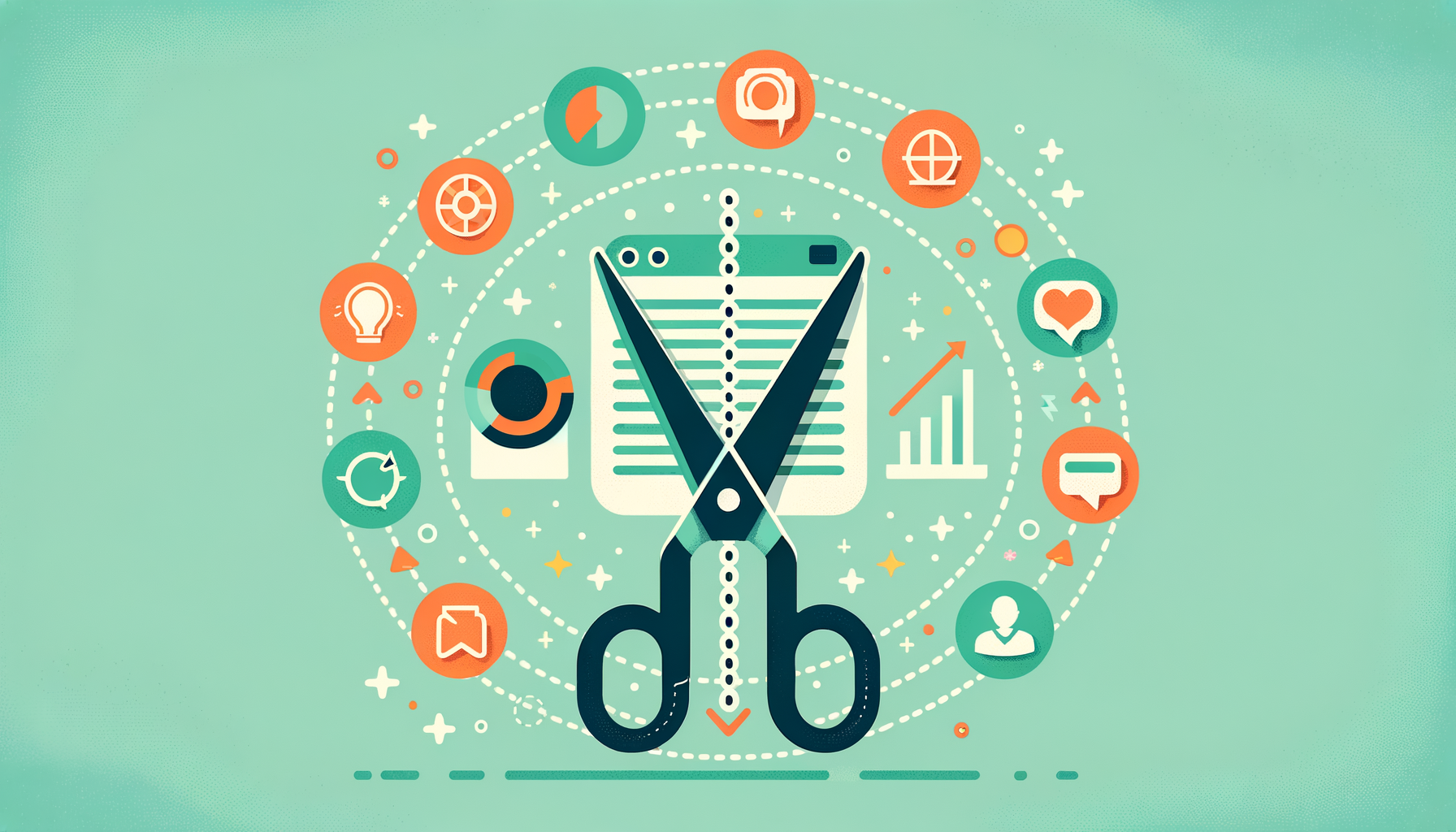The digital landscape is so vast. How can brands hope to find the most viable sales prospects?
The answer: You don’t. You let them find you.
That’s the core idea behind inbound marketing, an approach to marketing that seems tailor-made for the logistics and challenges of the digital age, taking advantage of search engines, social media platforms and online communication channels to drive potential customers into the waiting arms of B2B and B2C brands.

Simply put: Trying to market and sell to customers over digital channels without an inbound marketing strategy is a losing proposition. Not all businesses have the know-how, skills or personnel to recalibrate their marketing approach. Truthfully, it takes a concerted, top-down effort to shift away from outbound sales models (although not completely) and embrace inbound methods.
That’s why so many organizations find success partnering with an inbound marketing agency that understands all the different cogs at work and knows how to create an effective strategy.
What is inbound marketing?
For decades, traditional marketing has been dominated by outbound strategies: cold-calling prospects, running advertising campaigns and attending industry events. While those methods still have their place in a well-rounded marketing approach, they aren’t well-suited for channels like organic search, social media and email. It’s just too difficult to seek out your target audience across all of those digital touch points and hit them with the right message at the perfect time.
Inbound marketing takes a fundamentally different approach, drawing in potential customers and systemically weeding out low-intent users while nurturing qualified leads and guiding them toward a purchasing decision.
How’s it done? There are a lot of methods inbound marketers employ to reel in new customers:
- Optimize websites and landing pages to rank higher in search engine result pages.
- Create compelling content like blogs, videos and infographics that drive organic traffic to brand websites.
- Share content on social media platforms to raise brand awareness.
- Gate downloadable content to capture leads and build email lists.
- Nurture leads and maintain customer relationships with targeted email marketing campaigns.
- Provide calls-to-action that let users decide when they want to take another step in the buyer journey, such as scheduling a product demo or consultation.
The key is that all of this content provides value to your target audience. Despite what “Glengarry Glen Ross” might have you believe, you shouldn’t always be closing. Rather than constantly pitch potential customers, inbound marketing strategies steadily build a relationship with them. Sprinkle in some brand messaging here and there, demonstrate value over time and pounce on sales opportunities when leads are ready to talk.
It’s a long process, taking months or even years to really hit its stride, but an effective inbound marketing strategy supports every phase of the customer journey and sales funnel, generating more qualified leads that are ready to buy. And that means more revenue with fewer headaches.
What is an inbound marketing agency?
Inbound marketing campaigns are inherently complex, with tons of moving parts. To make everything work, you need a variety of skills and competencies:
- SEO.
- Marketing strategy development.
- Copywriting.
- Design.
- Video.
- Social media.
- Email marketing.
- Analytics.
- Web development.
That’s a lot of ground to cover, and few marketing departments have all the tools or personnel necessary to hit on every critical aspect of inbound marketing.
Inbound marketing agencies provide everything businesses need to succeed, creating entire strategies from scratch, supplementing current efforts with additional support or acting as a marketing consultant that assesses inbound marketing tactics and recommends changes.
How does that differ from an outbound marketing agency? It comes down to their focus areas. Whereas an outbound marketer knows how to promote a brand message to a broad audience, inbound marketing companies specialize in bringing the best and most qualified prospects to the brand.
Their core competencies include brand awareness, lead generation and lead nurturing. Inbound marketing consultants understand the symbiotic relationship between marketing and sales, funneling viable prospects to sales teams while leveraging sales collateral and insights to develop compelling content and guide marketing strategies.
Full-service inbound marketing agencies do whatever is needed to meet marketing, business and commercial goals. The tools are available whenever you need them.
What kinds of services are typically offered through an inbound marketing agency?
As noted, inbound marketing is pretty complex, and so agencies that specialize in this field typically offer a wide variety of services to cover everything.
SEO services
Your brand website is ground zero for inbound marketing. All of your efforts lead back to your site eventually: organic traffic on search engines, social media users, email newsletters, etc.
As such, your website needs to be primed to draw in the right audience and keep them around. Search engine optimization services ensure that your site can be easily found and adheres to the signals Google and other search engines use to rank results.
That involves a lot of work on both the backend and frontend. Inbound marketing agencies can assess site performance to determine what changes should be made to improve your visibility and search ranking, as well as enhance user experience.
A good partner agency will extend that mindset to other service areas, incorporating SEO best practices into editorial, web designing and video content.
Content creation
Different forms of content have their own roles to play in the buyer journey. Inbound marketing agencies understand how to craft engaging content that fits into every stage of the sales funnel to create a comprehensive content marketing strategy.

Analysis
Every aspect of your marketing strategy should be scrutinized on a regular basis. Inbound marketing specialists can provide analytics services that shine a light on every corner of your marketing campaigns to determine if they’re getting the job done or holding you back:
- Is content bringing potential customers to your website?
- Is your site ranking for targeted keywords?
- Are your email marketing strategies nurturing leads?
- How are social media users responding to your brand?
- Are you converting site visitors into qualified leads?
Inbound marketing can be a moving target, and businesses need to continually refine their approach to reach the right audience, build relationships and guide potential customers to make a purchase.
Consultation and strategy
Strategists at these kinds of agencies eat, sleep and breathe inbound marketing. They understand what it takes to be successful in online marketing. These specialists always keep an ear to the ground to spot emerging trends and adjust their marketing tactics to account for industry changes and updates to search ranking algorithms.
With their assistance, businesses can scrap losing strategies and right their internet marketing ships. That might include, for instance, developing buyer personas that accurately reflect your target audience and the role they play in making purchasing decisions. Or supplementing campaigns with pay-per-click advertising. Or developing an email marketing campaign to nurture leads or win back former customers. There’s no limit to the insights and support that these marketing experts can provide.
Consultants and strategists are uniquely adept at sussing out missed opportunities and ways to keep improving your inbound marketing efforts.
What kinds of businesses would benefit from working with an inbound marketing agency?
Any of them.
Like we said before, inbound marketing encapsulates a lot of different skills and focal areas. Does your average marketing department have access to web designers, copywriters, videographers, SEO specialists, social media experts and online marketing strategists?
Probably not.
Inbound marketing agencies have all of that talent and expertise housed under one roof. They can be your one-stop shop for all of your marketing needs.
When should you reach out to an inbound marketing agency?
There are plenty of tell-tale signs to tell you when it’s time to reach out to an inbound marketing company. Here are just 7 of them:
- Your site isn’t bringing in organic traffic.
- The people coming to your site aren’t viable sales prospects.
- Your site isn’t ranking for relevant search terms while the competition seems to be doing just fine.
- Potential customers cut off communication with your brand before they reach a purchasing decision.
- Email campaigns aren’t generating sufficient ROI.
- Your brand doesn’t have much of a social media presence.
- Your target audience largely doesn’t recognize your brand or know what it represents.
These are all symptoms of a moribund online marketing strategy. But the good news is, you can always turn things around with expert inbound marketing services
What to expect when working with an inbound marketing agency
Marketing agencies have many different departments overseeing their various services. Ideally, they should have a lead point of contact to facilitate communication, share feedback and coordinate efforts.
At Brafton, every account is spearheaded by a project manager or content marketing strategist – often, our clients work with both. This keeps projects on track, shortens production timelines and generates the best possible results.
Every project stakeholder, including copywriters, designers, social media specialists and strategists, learns the ins and outs of your business, your industry, your competition and your target audience. That’s how we’re able to create content that resonates with potential customers, maintain the sales funnel and build inbound marketing strategies that get the job done.
What about results?
Well, that largely depends on your marketing and commercial goals. We adjust our approach according to our clients’ business objectives so we can deliver the KPIs that matter most to them:
- Increasing organic traffic.
- Improving online visibility.
- Establishing your brand as an industry thought leader.
- Generating more qualified leads.
- Producing higher conversion rates.
- Creating more revenue.
At the end of the day, we grade our inbound marketing services on our ability to produce tangible results that can be quantified in dollar figures. If we’re not helping you make more money, we’re not doing our jobs.
You don’t have to go it alone. In fact, you shouldn’t.
A partner agency can improve every aspect of your marketing strategy. Wherever you are in your marketing journey, and whatever execution gaps you have, inbound marketing services can turn any campaign around and start producing results that matter.





